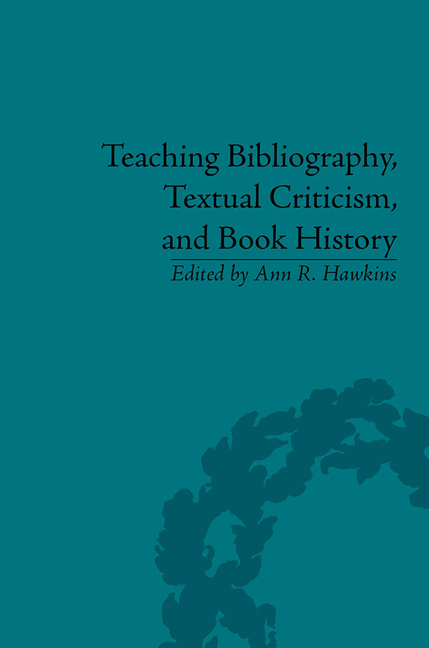Book contents
- Frontmatter
- Contents
- Notes on Contributors
- Foreword
- Introduction: Towards a pedagogy of Bibliography
- Part I Rationales
- Part II Creating and Using Resources
- Part III Methodologies
- Teaching ‘History of the Book’
- Teaching Bibliography and Research Methods
- Teaching Textual Criticism
- 20 How Things Work: Teaching the Technologies of Literature
- 21 ‘Not to Pick Bad from Bad, But By Bad Mend’: What Undergraduates Learn from Bad Editions
- 22 Book History and Reader-Response Theory: Teaching Shakespeare's Romeo and Juliet and King Lear
- 23 Textual Criticism: Students as Book Detectives and Scholarly Editors
- Afterword
- Part V Resources
- Index
Afterword
from Teaching Textual Criticism
- Frontmatter
- Contents
- Notes on Contributors
- Foreword
- Introduction: Towards a pedagogy of Bibliography
- Part I Rationales
- Part II Creating and Using Resources
- Part III Methodologies
- Teaching ‘History of the Book’
- Teaching Bibliography and Research Methods
- Teaching Textual Criticism
- 20 How Things Work: Teaching the Technologies of Literature
- 21 ‘Not to Pick Bad from Bad, But By Bad Mend’: What Undergraduates Learn from Bad Editions
- 22 Book History and Reader-Response Theory: Teaching Shakespeare's Romeo and Juliet and King Lear
- 23 Textual Criticism: Students as Book Detectives and Scholarly Editors
- Afterword
- Part V Resources
- Index
Summary
What to say to a reader who has plowed through two dozen or so richly instructive and provocative essays after that journey has been completed? Anyone who teaches the history of books and printing, bibliography and methods of research, textual scholarship, or other related subjects, should find ample materials here to assist in planning classes devoted solely to such subjects or which treat them as subfields in broad courses. They will work for instructors in a college or university English, history, or history of art department, a library school, or a state or regional center for book arts, and for instructors in undergraduate or graduate classes, certificate programs, or continuing education. Covering an immense amount of the bookish waterfront, they are full of ideas, often extremely good ones. Their writers have thought usefully and carefully about many of the pedagogical issues and possibilities that classes in these related fields pose.
Nonetheless, in what follows I would like to speak not about the strengths of these essays – does any reader who has got this far in the volume need to be told about them again? – but rather to try to extend the conversation these essays provoke. That conversation, it seems, must concern not only pedagogical techniques but also the nature and purposes of the field these essays address.
One obvious issue that needs additional discussion and thought emerges from the insistence, reiterated throughout these essays, on the primacy of the material object, even though their writers also carefully tell their readers that they would never negate the merits of theorized (or ‘abstract,’ as one writer calls them) aspects of book studies. My orientation to this subject similarly begins with the materiality of the objects I acquire. I often pay a lot of institutional money to get them, one ‘material’ aspect of the book I must worry about constantly. I also assist in caring for the many material objects by which my colleagues and I are surrounded.
- Type
- Chapter
- Information
- Teaching Bibliography, Textual Criticism, and Book History , pp. 178 - 184Publisher: Pickering & ChattoFirst published in: 2014



